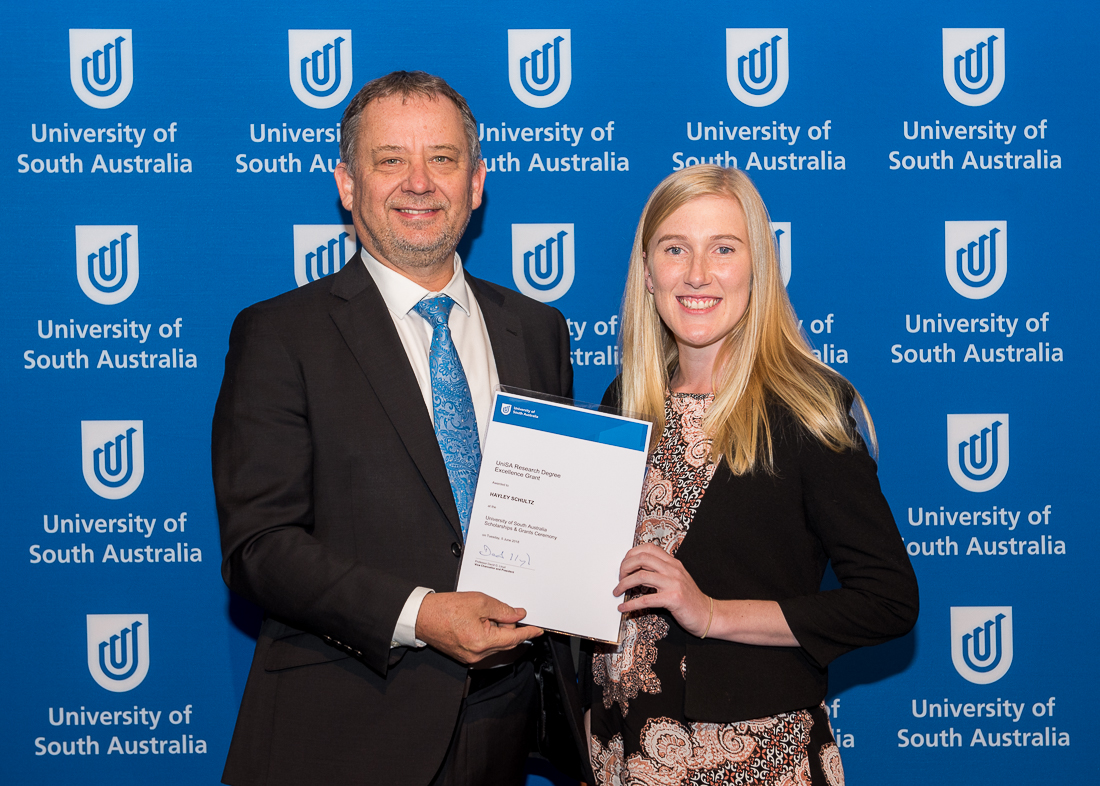01 June 2018

Hayley Schultz
PhD Candidate, UniSA and CBNS
Bachelor of Pharmaceutical Science
Bachelor of Pharmaceutical and Medical Sciences (Honours) (First Class Honours)
Doctor of Philosophy (PhD), Pharmaceutical Science – Oral Drug Delivery
Early career pharmaceutical scientist Hayley Schultz was recently awarded the UniSA Research Degree Excellence Grant, recognising her promising work to improve the oral absorption of drug molecules in patient treatments. The Grant is helping Hayley with her important research which could change the treatment experience of men with advanced prostate cancer.

With the funding from the Grant, Hayley will attend a series of international conferences in Singapore in September and the US next month, including workshops and meetings with academics and industry in pharmaceutical science, where she will present her work.
“Last year I had the opportunity to attend the International Pharmaceutical Federation Conference for Pharmaceutical Science in Sweden—it was an eye-opening experience, so I’m really looking forward to this next opportunity to grow my international knowledge.
“As an early career researcher I need to take every opportunity to grow my research profile and network with others in my field. I’m so grateful to the donors who supported the establishment of this award as it will help me achieve my PhD and gain the industry knowledge I need to continue in my career path.”
A donor-funded initiative at UniSA established the 25th Birthday Scholarship Fund to support students in their higher education studies. This year Hayley received the UniSA Research Degree Excellence Grant, supported by the birthday fund to recognise exceptional work undertaken by PhD or Masters by Research students.
Winning the Gould Experimental Science Grant in 2017 has also cemented Hayley’s position as a rising star in the field of pharmaceutical research.

“I am so inspired by Dr Ian Gould AM, who I first met in 2017 when I was interviewed for the grant.
“He has had such a diverse career and has taken opportunities as they have been presented to him, which is really inspiring and affirming for me, as I have never had a clear career goal in mind, and like Dr Gould, I have taken opportunities as they have come.”
One of these opportunities recently included selection as a finalist in the 2018 SA Fresh Scientist media training program—designed to help early-career researchers develop media and presentation skills to the non-scientific community.
“As I start to think more on the next stage of my career I am very interested in working in clinical trials. I would love to be involved in a trial, to be giving a treatment to people because it could be the next big breakthrough medication—I think that would be really exciting.
“I hope to learn more about clinical trials on my tour of US Industry next month; who knows, if my drug delivery formulation succeeds maybe I will have the chance to take it to trial.”
Reworking the formula for better prostate cancer therapy
Hayley Schultz has created a promising new oil based formulation with high drug loading to improve the oral delivery of poorly water soluble drugs. She is currently trialling it on a treatment for advanced prostate cancer.
Drug molecules have quite a challenge ahead of them when they enter the body via the oral route. They must dissolve in the contents of the gut before being absorbed across the gut wall and entering the bloodstream. This is especially so for drugs with poor water solubility.
“When drugs have poor water solubility they don’t dissolve or absorb very well, so large oral doses are given to ensure enough of the drug enters the bloodstream so it can have a therapeutic effect,” says Hayley.
This is a major hurdle for pharmaceutical scientists working to develop oral medications. As much as 40% of current and new medications have poor water solubility, where only small amounts of the drug actually enters the bloodstream upon oral administration.
“Testosterone stimulates prostate cancer cells to grow, so patients are often given an androgen depletion therapy (ADT) that blocks the production of testosterone.
“A particularly complex ADT oral treatment is used in castrate resistant prostate cancer called abiraterone acetone. It is prescribed in very high doses because only about 5% of the drug is absorbed due to its poor water solubility.
“It is also highly sensitive to the pharmaceutical food effect, so if a patient eats food too close to taking their tablets they can absorb greater, unknown and potentially toxic levels of the drug. This is because the drug dissolves much better in the oily or fatty food digesting in the gut.
“The new oil based formulation I have created can mimic the effect of food on this ADT treatment to improve its absorption. To do this we pre-dissolve large amounts of the drug in oil and then encapsulate it in nanoporous silica to stabilise the formulation.
“The oil helps the drug to dissolve and absorb easier in the gut resulting in high and consistent amounts of drug entering the bloodstream regardless of whether the patient has eaten food close to the time of administration. This means that we can reduce the dose as more of the drug will be absorbed with the help of this approach.
“This is significant for these patients as they have such a difficult therapy regime that requires them to remember to fast every day and then take large quantities of tablets.
“My work has shown that this approach works and could drastically improve the quality of life of these patients.
“Ultimately, I would like to see this formulation provide better drug delivery for many different types of pharmaceutical treatments.”
To support students through scholarships or join UniSA’s Fight Against Cancer, visit: http://www.unisa.edu.au/giving




